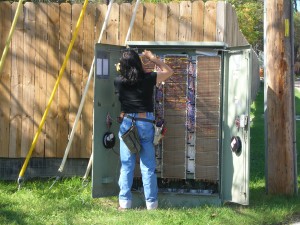What does it say about society that a report on two UK 4G trials hits prime time nine o’clock news on the BBC? Probably that everyone still can’t get their heads around billions of Euros being thrown about and is looking for a little good news or at worse a new topic.
I thought the report, which had to address a rather wide 9pm audience, was good. In summary, 4G is coming and the speed and performance look great. A quick Google search finds that Gizmo has been using the O2 London-based trial for a week and is giving it rave reviews.
So with that good news ringing in our ears, we may think the battle of mobile data is done, but unfortunately wars are never that straight forward.
I would highlight to the event world that, whilst 4G will help tremendously with getting data access where we want it, it won’t address the primary challenges.
The march of progress: when 3G was starting to hit the market in 2003, it was to be the fastest, most reliable service in the world. At that time, most people in the UK used GPRS services on their devices, which delivered a speed of 9 kbps (pioneers at the time were using data cards with their laptops); compared to that, the theoretical throughput speed jump of 3G (2048 kbps) was immense. 3G was released and what happened? Firstly, deployment was slow and the real world speeds were much slower than the hype. Nearly 10 years on, coverage is still patchy and performance erratic.
Then we all got smartphones. So now not only do we want access to web sites, but we also want to watch iPlayer. We don’t make calls any more: we want to use face time. You get the picture (no pun intended). These developments are brilliant and make us more productive, keep us in touch with our families, etc. but what we continue to do is increase our data demand exponentially. That demand will not stop; 4G will just catch up, arguably to behind the demand curve when it eventually comes to market.
Law and order; OFCOM controls all licenced wireless broadcasts in the UK. For any UK carrier to broadcast on a 4G frequency and therefore offer services they must buy the licence. The sales of those licences has just been pushed back until the back end of 2012. So first not only do the carriers have to buy the licence (a massive investment which even for the largest carriers is a significant spend) but then they have to actually start to pay to upgrade their base stations to 4G just like they have with 3G. Have they finished upgrading all base stations with 3G yet? Ah. Good point.
The density spike; a key point for our event customers. 4G fundamentally operates in the same way as all GSM technologies in that it’s designed to be broadcast from several central points to cover a town. The design relies on relatively consistent demand. Throughput is constrained by the amount of spectrum each company has purchased from OFCOM and not solely on the amount of hardware deployed. Therefore when that bandwidth is fully utilised during abnormal spikes of activity there is not much that can be done to improve service. You can’t deploy 30 base stations around a site however much you wanted as you can’t service any more customers than you can with say 4. Service can be cleverly deployed using the topography of the site but in reality you are designing around the limitations of the way the system is designed. Here Wi-Fi has the edge since each ‘cell’ is much smaller and can be deployed all over an event site.
The cost; as always this is the million pound question. The carriers learnt from a lot of mistakes when they deployed 3G – and we should all sympathise. They purchased the licence from OFCOM for billions (Vodafone paid £5.9 billion for the rights to some 3G spectrum in 2000) and then tried to charge per MB but no one bought it because they found themselves operating in a world where customers want unlimited tariffs just like their home internet. Now they have to pay again for 4G licences. How will the charging model work? People want data ‘free’ but there is a huge infrastructure cost at a time when chargeable call volumes are dropping.
Just a little food for thought, it will be interesting to see how the trial in Cornwall, which is looking at how 4G can be used to help get internet access to remote locations (a great application) goes over the next few months and how manufactures start to line up devices for us to enjoy this need for speed with.


